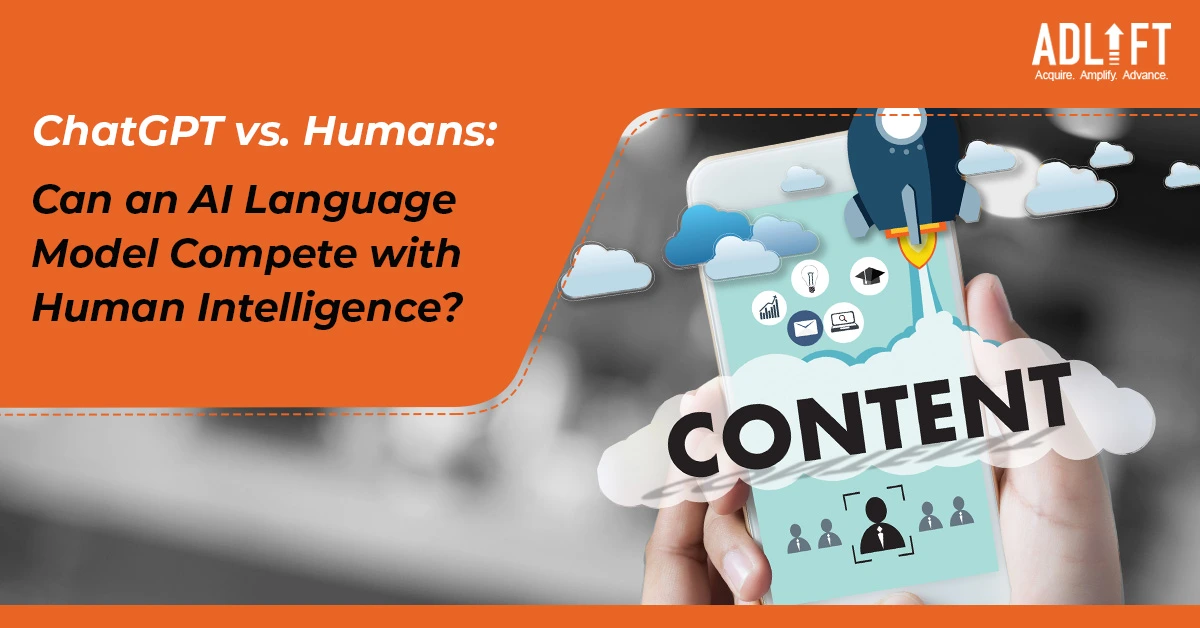ChatGPT vs. Humans: Can an AI Language Model Compete with Human Intelligence?

Humans have traditionally been considered the most sophisticated species when it comes to intellect. But the advent of Artificial Intelligence (AI) has sparked the question of whether an AI language model can compete with human intelligence. This article seeks to investigate the potential of ChatGPT, a language model created by OpenAI, and compare it to human intelligence.
What is ChatGPT?
ChatGPT, an AI language model created by OpenAI, is the product of a research laboratory comprising the world’s leading artificial intelligence experts. The GPT in ChatGPT represents the Generative Pre-trained Transformer, a form of neural network utilized in the model. ChatGPT’s goal is to produce responses similar to those generated by humans in response to natural language input.
What are the abilities of ChatGPT?
ChatGPT is a highly sophisticated language model that is capable of a wide range of tasks. It has been trained on an enormous amount of data, allowing it to produce human-like responses to natural language input.
ChatGPT abilities:
ChatGPT exhibits the ability to participate in natural language conversations with humans, making it a conversational AI. It can furnish information, answer inquiries, and even hold captivating discussions.
Additionally, ChatGPT can translate text from one language to another, such as English, Spanish, French, German, and more. The language model can generate top-quality content for various intents, such as articles, blog posts, product descriptions, and social media posts.
It can also analyze the sentiment of text to identify whether the text is positive, negative, or neutral. ChatGPT can also condense lengthy text into shorter, easier-to-read summaries.
Can ChatGPT Compete with Human Intelligence?
Although ChatGPT is an advanced language model, it is debatable whether it can compete with human intelligence. ChatGPT can perform many tasks previously exclusive to humans, but there are still several areas in which it falls short.
Creativity:
While ChatGPT can produce high-quality content, it lacks the creativity that humans possess. Humans can generate original ideas and invent innovative solutions.
Emotional Intelligence:
ChatGPT can analyze the sentiment of a piece of text, but it lacks the emotional intelligence that humans have. Humans can comprehend and empathize with others on a profound level.
Common Sense:
ChatGPT lacks the common sense that humans possess. Humans can make intuitive judgments based on their experiences and understanding of the world.
Critical Thinking:
ChatGPT does not possess the critical thinking skills that humans have. Humans can analyze complicated problems and come up with solutions based on their expertise and experience.
Learning and Adaptation:
While ChatGPT can learn from data, it does not possess the same ability to learn from experience as humans do. Humans can adjust to new circumstances and learn from their errors.
In conclusion, although AI language models such as ChatGPT have made impressive progress in language processing, it is crucial to acknowledge that human intelligence still has a significant advantage in many areas. Human intelligence includes a wide range of skills and abilities, such as creativity, emotional intelligence, and critical thinking, that are necessary for our daily lives. While AI can support humans in various fields, it cannot entirely replace the importance of human intuition, empathy, and personal touch. Moreover, there are ethical and moral concerns associated with relying solely on AI in certain industries like healthcare and finance.
Thus, it is crucial to find ways to combine AI technology with human intelligence to maximize its advantages while maintaining the unique value of human intelligence. Ultimately, the collaboration between humans and AI can lead to greater innovation, progress, and success.
FAQs
Ans: ChatGPT is an AI language model that operates on a two-step process: pre-training and fine-tuning. ChatGPT is trained on a massive amount of text data from the net that envelop various topics and writing styles. Then it is fine-tuned using reinforcement learning to optimize response quality.
Ans: ChatGPT can do various tasks, yet it needs to catch up to human intelligence. Despite its ability to generate impressive human-like content, it still lacks the potential of human abilities. It lacks human experiences and creativity. With future technological advancements, ChatGPT will come to par with human intelligence, but it can not replace human intuition.
Ans: ChatGPT falls short of human intelligence in areas such as creativity, emotional intelligence, critical thinking, learning and adaptation, common sense, and personal touch.
Ans: ChatGPT can produce high-quality content, but it lacks human creativity. The creativity of ChatGPT depends on learned patterns in its training data, whereas human creativity draws from experience.
Ans: ChatGPT’s emotional intelligence is primitive compared to the complexity of human emotional intelligence. While it can respond and create content with seemingly empathetic phrases, there is an absence of genuine emotional experience, empathy, and comprehension of a human.
Ans: ChatGPT’s common sense is limited in contrast to human understanding. While it can generate coherent responses based on learned patterns, it lacks the intuition and practical wisdom that humans possess.
Ans: ChatGPT’s critical thinking pales against human capacity. It can analyze data patterns to generates logical answers but does not have human cognitive skills. Human critical thinking involves context integration and creative problem-solving skills. ChatGPT has an inadequate human understanding of varied perspectives limiting its ability to engage in multifaceted, adaptive critical thinking that humans excel at.
Ans: ChatGPT’s learning and adaptation are data-driven compared to the dynamic nature of human knowledge. However, human understanding is holistic, driven by cognition, and emotion, enabling deep comprehension and abstract thinking. Human adaptation involves factors like culture and experience, leading to genuine behavioral changes.
Categories
Recent Posts
- Boost Your Website’s Visibility with These Must-have B2B SEO Tools January 13, 2025
- Master Your Digital Strategy: Learn the 7 Types of SEO That Lead to High Rankings January 13, 2025
- 2024: A Year to Remember at AdLift! January 7, 2025
- How to integrate your SEO and paid search strategies to maximize efficiency and reduce CAC January 6, 2025
- SEO in 2025: Adapting to a Changing Search Landscape By Prashant Puri, CEO & Co-Founder, AdLift January 3, 2025
- Understanding the Google December 2024 Spam Update: What You Need to Know December 31, 2024
- Beware of Ongoing Scams Involving Fake AdLift Representatives December 31, 2024
- Facebook vs Twitter: Which Platform Wins for Your Marketing Goals? December 30, 2024
- The Art of Naming Conventions in Marketing Campaigns: Best Practices for Clarity and Success December 26, 2024
- Is Your Content Strategy Working for You — or Against You? December 19, 2024
Get
in Touch
Contact AdLift for a 360-degree marketing plan

